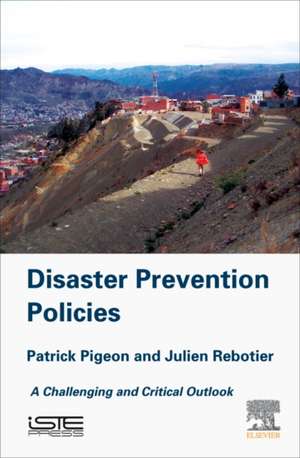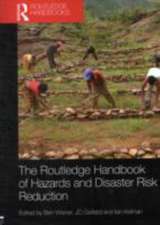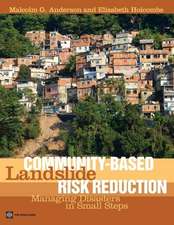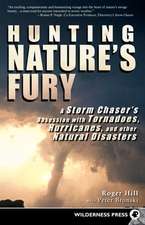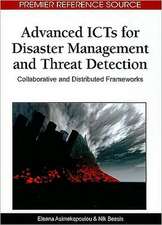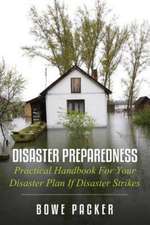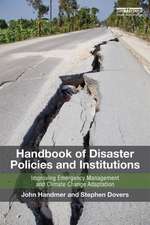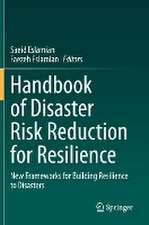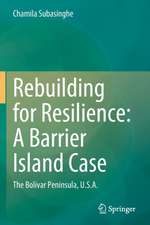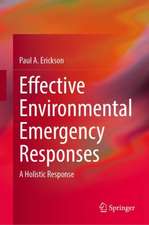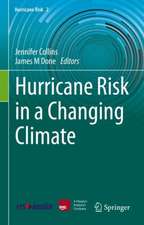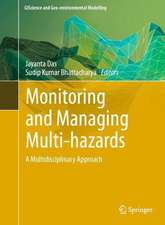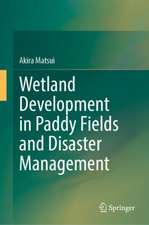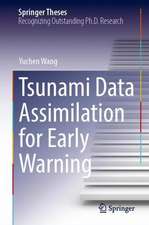Disaster Prevention Policies: A Challenging and Critical Outlook
Autor Patrick Pigeon, Julien Rebotieren Limba Engleză Hardback – 11 oct 2016
- Offers a fresh perspective on the assessments currently available on disaster and DRR policies
- Provides insight based on examples of DRR policies taken from Latin American, Asian, and European cases
- Focuses on reducing the paradox that exists between the compulsory implementation of DRR policies and continuing limitations
Preț: 448.12 lei
Nou
Puncte Express: 672
Preț estimativ în valută:
85.74€ • 89.53$ • 70.81£
85.74€ • 89.53$ • 70.81£
Carte disponibilă
Livrare economică 25 martie-08 aprilie
Livrare express 08-14 martie pentru 40.13 lei
Preluare comenzi: 021 569.72.76
Specificații
ISBN-13: 9781785481963
ISBN-10: 1785481967
Pagini: 240
Dimensiuni: 152 x 229 x 26 mm
Greutate: 0.57 kg
Editura: ELSEVIER SCIENCE
ISBN-10: 1785481967
Pagini: 240
Dimensiuni: 152 x 229 x 26 mm
Greutate: 0.57 kg
Editura: ELSEVIER SCIENCE
Public țintă
National and international academic and management teams in the fields disaster and disaster risk reduction policies; Organizations involved in environmental protection.Cuprins
Part 1: Disaster Prevention Policies: Paradoxical and Ambiguous Assessments
1: The Rise in Knowledge and Policies Suggest an Increase in Disasters
2: The Contributions to Disaster Prevention are Difficult to Assess
Part 2: Understanding and Managing Disaster Risk: The Multiple Limits of Specialized Approaches
Introduction
3: The Limits of Understanding Disasters
4: The Limits of Disaster Prevention: Returns on Management Experiences
Part 3: Why and How Does the Prevention of Disasters Necessitate Thinking and Acting in an Imperfect World?
Introduction
5: The Principle of Cognitive Limits: Its Application to Disaster Prevention
6: Bridging the Gap between Disaster Prevention and Environmental Concerns
7: Reflections upon the Contribution of Social Geography to Disaster Prevention
8: How Can We Best Manage Disasters?
1: The Rise in Knowledge and Policies Suggest an Increase in Disasters
2: The Contributions to Disaster Prevention are Difficult to Assess
Part 2: Understanding and Managing Disaster Risk: The Multiple Limits of Specialized Approaches
Introduction
3: The Limits of Understanding Disasters
4: The Limits of Disaster Prevention: Returns on Management Experiences
Part 3: Why and How Does the Prevention of Disasters Necessitate Thinking and Acting in an Imperfect World?
Introduction
5: The Principle of Cognitive Limits: Its Application to Disaster Prevention
6: Bridging the Gap between Disaster Prevention and Environmental Concerns
7: Reflections upon the Contribution of Social Geography to Disaster Prevention
8: How Can We Best Manage Disasters?
